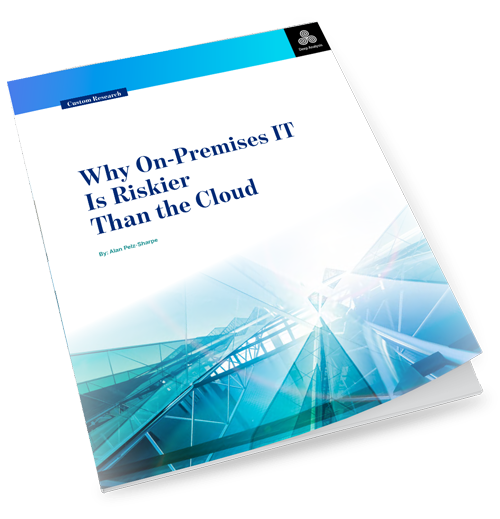Key considerations for trusting your valuable data to the cloud
As security breaches grow both more sophisticated and more commonplace, how can you ensure that your firm and your clients’ information is protected?
Law firms face unparalleled security threats today, not the least of which are the risks inherent in remote working. And the on-premises technology that today’s mobile workforce uses was never designed to support a hybrid work environment. But you can greatly reduce these risks, better control your data, improve productivity, and probably even lower your costs, by migrating your vital knowledge assets to the cloud.
There are three key considerations for making the decision to migrate your legal data and files to the cloud:
- Reduced risk and greater productivity
- Control of data and how data is shared
- Cost
Risk: Law firms and corporate legal departments find it challenging and costly to match the level of security compliance maintained in enterprise cloud computing environments. Most, in fact, do not come close, and many do not even try. According to the ABA, 27% of lawyers see “better security than I can provide in-office” as a benefit of cloud computing.
Productivity: We hear over and over about lawyers spending hours searching for documents they need. These firms have realized millions of dollars in productivity gains by migrating to the cloud and using search tools based on AI that are available only on that platform.
Control of data: Firms often say that they are unwilling to risk trusting client data to third parties. Yet almost without exception they are already risking it. Employees store files on portable storage devices and transfer files via email, Google, Dropbox, Box or similar third-party web apps. How certain are you that your on-premises security measures are in control of every file saved and transferred?
Cost: Though it is not a given, we can say with a high degree of authority that a full cost/benefit analysis of cloud versus on-premises most often favors the cloud. When it doesn’t, factors like increased security and governance, productivity, and ease of use, along with much more predictable cost projections, usually tip the balance.
We discuss several of the most common objections that we hear regarding trusting valuable data to the cloud. Download the whitepaper for detailed answers from Deep Analysis.
Why should we fix a system that’s not broken?
While you may believe that your on-premises solution is working “just fine,” what if “just fine” could be significantly improved for both users and clients? And your firm may not have had any obvious security issues, yet. But what if it’s just a matter of time? The 2020 ABA Legal Technology Survey Report noted the number of law firms experiencing a known security breach increased to 29 per cent in 2020.
The hybrid work environment can no longer be viewed as temporary – that proverbial ship has sailed. Even companies that initially voiced strong commitments to bringing workers back to the office are reconsidering that position and either making the return optional or pushing back the deadlines for an indefinite period.
Download the white paper to find out why you should consider moving to iManage Cloud on Azure and why now.
Upper management doesn’t trust the cloud
The time to be more proactive about security is now. Explain to your stakeholders that the threat landscape has changed and your on-premises data may no longer be protected from both old and new threats.
Do your due diligence to confirm that any cloud service provider you consider checks every box regarding the proper storage and security of your data. You should expect and demand all reasonable assurances that the provider offers the most advanced level of protection, and that it will be maintained at that level or better for as long as you subscribe to their services.
The cloud provider should also be able to show your leadership that the new technology supports the business outcomes they care about, whether mitigated risk, time saved, better performance, or lower cost. But no security is impenetrable. Read “Why On-Premises IT Is Riskier Than the Cloud,” to better understand how the relative security of an on-premises system stacks up against the cloud.
We need to protect the firm’s reputation
Your clients’ data is very sensitive and a single breach could destroy your firm’s reputation – we have clients, too, and we get it. We also understand why you might believe that putting client data in “some amorphous cloud somewhere” is a dereliction of your responsibility. But the research doesn’t support that assumption.
Each day that your firm delays making significant upgrades to your security profile to protect itself from a data breach in a hybrid work environment gives another 24 hours to bad actors looking for an opening to exploit your knowledge assets and client information.
Read “Why On-Premises IT Is Riskier Than the Cloud,” to learn why replacing an on-premises IT system with a iManage on Azure may be the best business decision you will make this year.
The importance of choosing the right cloud provider
Throughout history, humans have adapted to change by embracing new technologies and tools. Moving your firm’s files and data to the cloud is the logical next step in your journey toward a more secure future for your clients and your business. Any law firm considering migrating to the cloud can look forward to increased security, flexibility, support, and ease of use.
The move also enables security teams to focus greater attention on real time operations, cyber intel, data security, governance, user access and forensics. These and other benefits should increase your confidence that it’s the right move for the firm.

Why on-premises it is riskier than the cloud
Moving to the cloud may come with some risks, but this new research, from analysts firm Deep Analysis, reveals that staying on-premise might be riskier.




